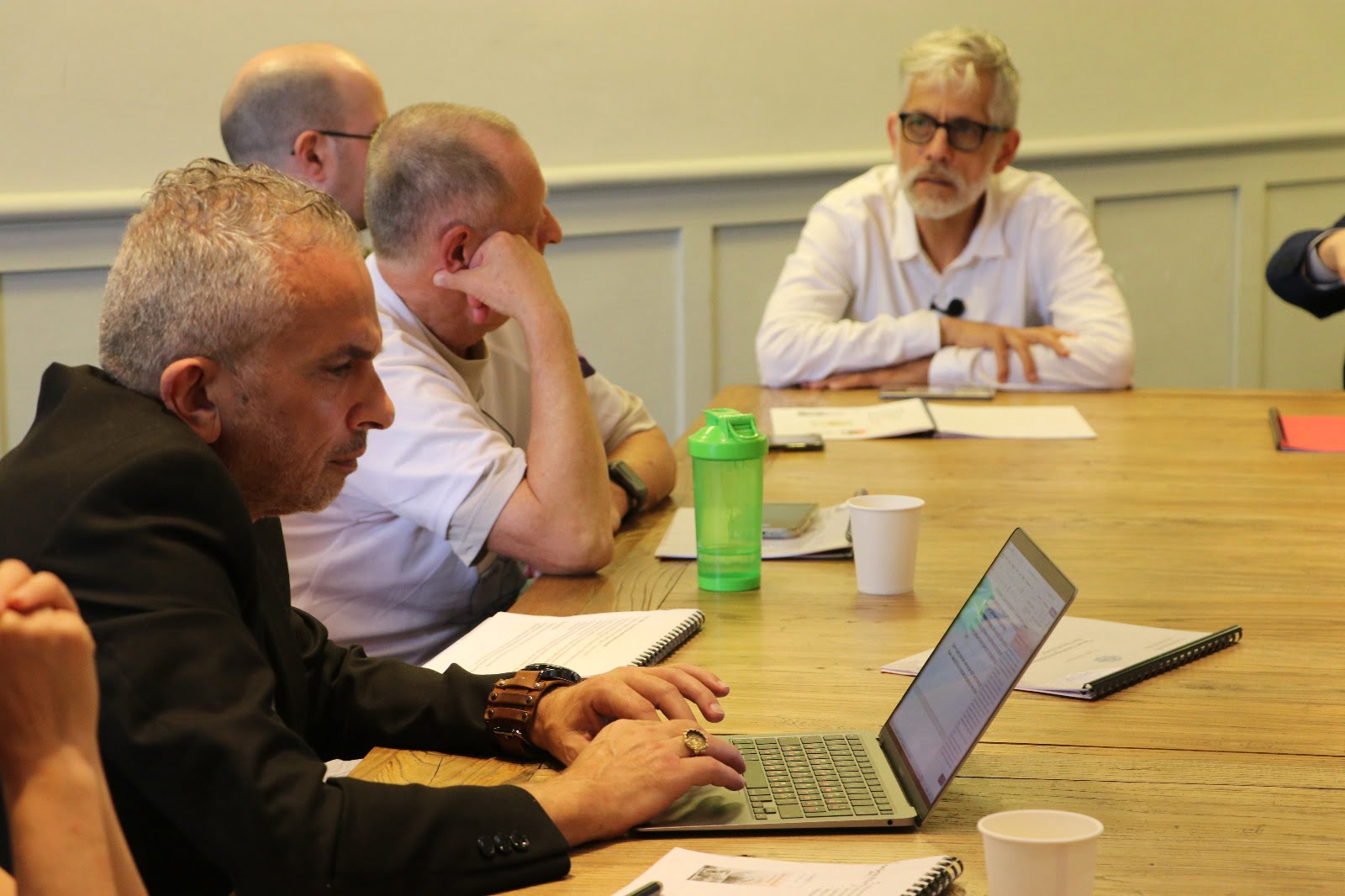
An expert discussion organized by the “Dor Moria” Association, the “Samuel Schwartzbard”
Foundation, and the “Turei Zaav” Association took place in Tel Aviv on April 18, 2024. The event
was titled “Israel: Ontological Bubbles as a Tool of Managed Chaos.” Experts discussed the
phenomenon of “ontological bubbles” in contemporary Israeli society, analyzing how the radicalization
of the political agenda and the dehumanization of political opponents within closed ideological
constructs serve as tools of managed chaos.
Background of the “Haifa Format” Project
The “Haifa Format” project was initiated in 2017 by “Dor Moria” activists and experts who
came to Israel from Russia and Ukraine. At that time, it was already anticipated that the processes of
civil confrontation observed in Ukraine could become a reality for Israel. Unfortunately, these
concerns were confirmed. Today, in 2024, Israeli society is divided by multiple socio-political
narratives.
In 2023-2024, “Dor Moria” conducted eight large-scale sociological studies, such as “Israelis
Attitudes towards the Armed Conflict in Ukraine” (March-April 2023); “Israelis’ Attitudes towards
Judicial Reform” (June 2023); “Expectations of Israelis for the U.S. Presidential Elections in 2024“
(August 2023); “The Image of the Future: Israel after the War” (October-November) and several
others.
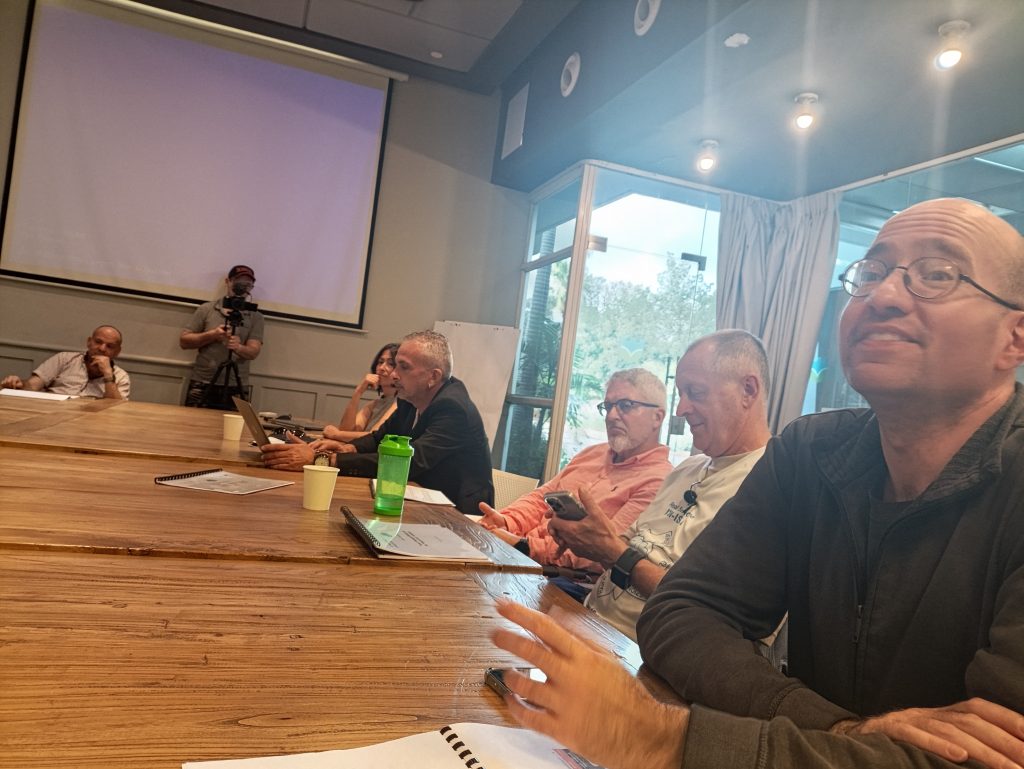
Based on our findings, it can be stated that the schism and radicalization of Israeli society are
empirical facts.
For example, a public opinion poll of Israelis conducted from 12.11.2023 to 16.11.2023 to study
positions regarding Israel’s war with Hamas in the Gaza Strip showed a division between right and left.
For instance, regarding the question “Is the complete destruction of Hamas possible?” the option
“possible” varies 2.5 times from right to left (from 85% among the right to 32% among the left). At the
same time, the option “impossible” differs 4.5 times between left and right (from 68% among the left
to 15% among the right).
The vision of Israel’s future after the war is also divided between political and religious-secular
groups. Representatives of moderately and left-leaning political views are more supportive of the
concept of “Two States for Two Peoples,” with 67% and 69% respectively. Overall, regarding the
image of Israel’s political prospects, they show the greatest unity.
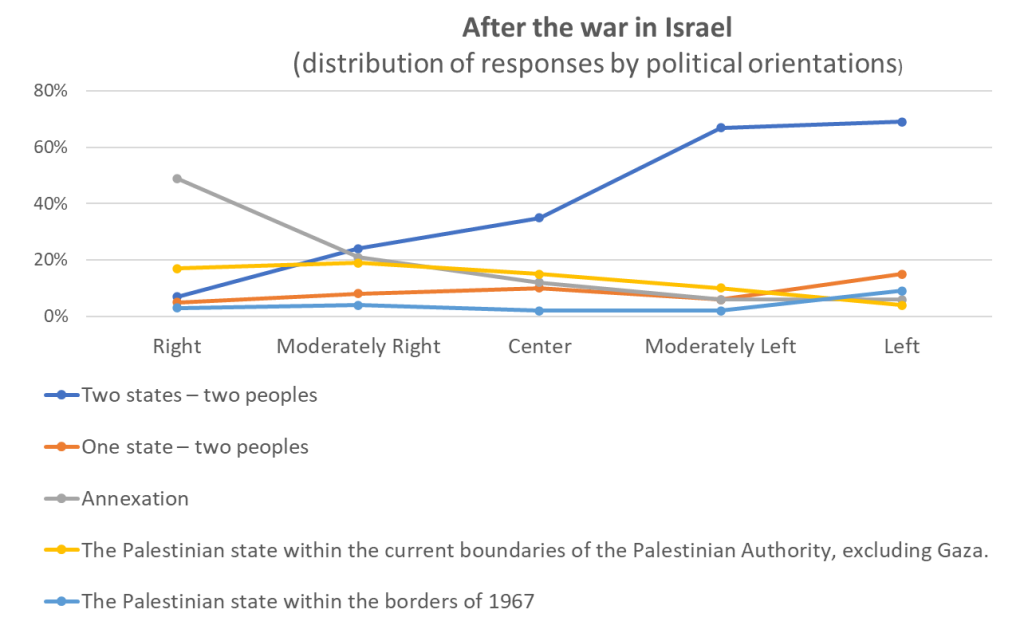
Not only have we come to this conclusion. Here’s a quote from the report of the “Israeli
Institute of Democracy”: “The schism between groups is growing. Even the events of October 7 and
the subsequent war, which were initially seen as unifying events, can now be seen as having only a
temporary cohesive effect on the previously existing internal situation…”
Schism and Bubbles
The key to understanding what is happening for us became the hypothesis of “ontological
bubbles” – dualistic competing worldviews forming in Israeli society. Their emergence is linked to the
tendency of human thinking to simplify complex reality into binary oppositions of “us-them,” “good-
evil.”
Ontological bubbles arise in pairs, during confrontation between carriers of opposing ideas,
values, and historical narratives. Each group absolutizes its own righteousness and completely denies
the “truth” of the opponent. Radicalization reaches a point where the political opponent is no longer
perceived as a human being, and political struggle turns into a struggle of the sons of light against the
sons of darkness.
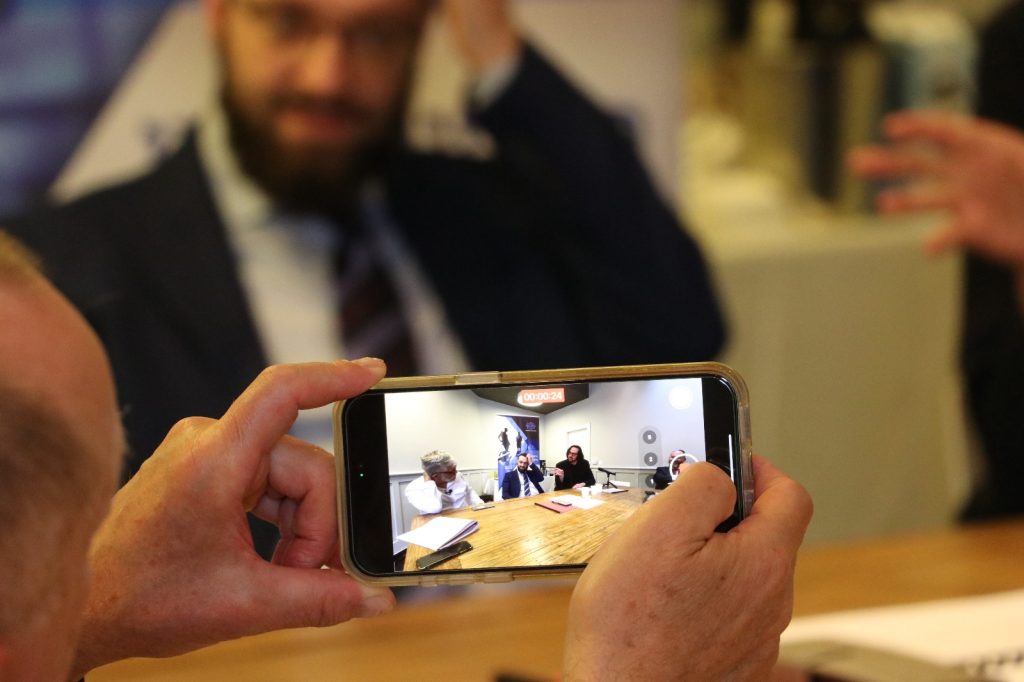
As Igor Kaminnik, the “Dor Moria” Association director, noted: “We see that the pair of
ontological bubbles gravitate towards two poles – the ‘postmodernist’ and the ‘traditionalist.’ The
postmodernist pole attempts to destroy any stable identities and traditions. The traditionalist, on the
other hand, seeks to impose rigid identities and norms. The conservative camp focuses on security,
traditional values, and a free market. The liberal camp advocates for reconciliation with Palestinians,
minority rights, and a social state.”
Lola Kolpina, PhD in sociology and the Dor Moria Analytical Center head, noted that the
formation of such ontological bubbles in society with impenetrable walls for “other” opinions is a
profitable business for the media and politicians.
In the battle for audience attention, any idea is simplified into a meme, any conflict is inflated
and dramatized. Rational discourse is pushed out of the public space.
The problem is that people caught in ontological bubbles lose the ability to hear each other,
locked in their informational cocoons. Any event only intensifies mutual rejection. As a result, the
basic institutions of society are paralyzed, and the country teeters on the brink of chaos. In these
conditions, conventional methods of information warfare no longer work, only exacerbating
polarization.
Political scientist and rabbi Mikhail Finkel, the Samuel Schwartzbard Foundation head, sees
ontological bubbles as a tool for managed destabilization aimed at destroying Israel and believes it is
necessary to resist these destructive tendencies.
Professor from the USA, Aaron Cohen, showed that the problem of managed chaos is not only
relevant to Israel: “Three corporations that control 87% of the American market include BlackRock,
Vanguard, and State Street. These companies are often referred to as the ‘Big Three’ because of their
dominant position in the asset management industry.
The market is monopolized, including the media and platforms. So whether you’re on the right or
the left, it doesn’t matter, the same people own Fox News, NBC, CNN, CBS, NYT, Facebook,
Instagram, etc. From the far left to the far right media, the owners are all the same. And politicians are
naturally in the pockets of these corporations. America’s military-industrial complex is also in these
same hands, and huge money was made from the Ukrainian war.” If the goal is to turn political discussions, natural in democratic countries, into irreconcilable ontological bubbles, then media
owners can certainly do it, possessing certain technologies.
Writer and coordinator of the “Constitution Referendum Project for the State of Israel,” Eduard
Batkis, notes that Israel’s internal rifts are compounded by divisions brought in from outside. For
example, the situation with the war in Ukraine adds additional internal political tension. The activity of
pro-Ukrainian forces in Israel pushes the country towards active participation in the Ukrainian conflict,
which is officially referred to differently in Russia and Ukraine, but is never named as a war.
At the same time, monitoring of Israeli concerns regarding the war in Ukraine shows an
interesting dynamic and results. In June 2023, when asked, “Which of the following possible risks, in
your opinion, is the main one when involving the State of Israel in the conflict between Russia and
Ukraine?”, 54% of respondents indicated “Deterioration of relations with Russia.” However, after
the Hamas attack on October 7, this figure decreased to 48%.
“Derech Eretz” as Saving Values
As noted by Alexander Haiat, a rabbi and the “Turei Zaav” association head, in order to preserve
Israel as a country, it is necessary to oppose ontological bubbles with values and principles that would
unite both secular and religious Israelis. He referred to “Derech Eretz” as a kind of bridge between
religious and secular:
“Derech Eretz” in Judaism implies:
Respect for the dignity and rights of every human being as a creation of God;
Harmonious combination of Torah (spirituality) with “earthly” affairs and concerns;
Primacy of the common good over selfish interests.
“Derech Eretz” as universal ethics:
Basic principles of humanity, relevant to people of different views;
A guide for moral behavior in society;
Antidote to fanaticism, intolerance, moral absolutism;
Basis for dialogue and cooperation “above barriers”;
Path to harmonizing Israeli society in its diversity.
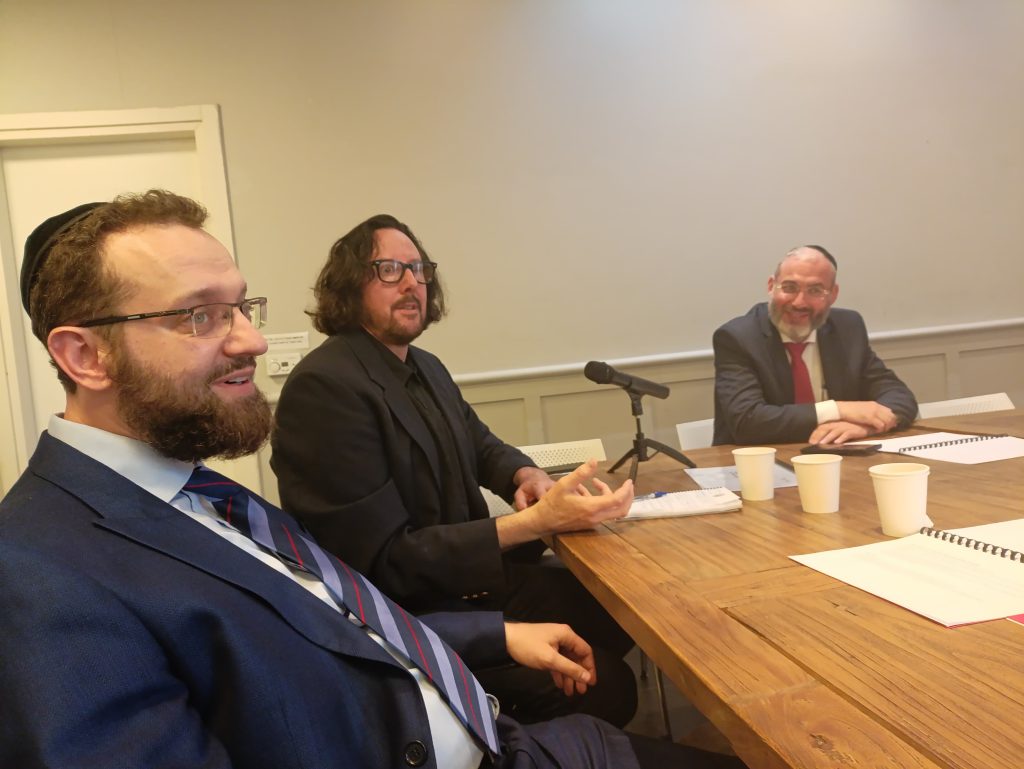
The “Dor Moria” Association, the “Samuel Schwartzbard” Foundation, and the “Turei
Zaav” Association have decided to join forces within the all-Israeli movement “Derech Eretz.” The
goal of this movement is to preserve and strengthen our state, counteracting the formation of
ontological bubbles by uniting the healthy forces of Israeli society.
The “Derech Eretz” movement believes that this path is possible. And we invite all people of
goodwill to walk it together. For the future of Israel and our children.
